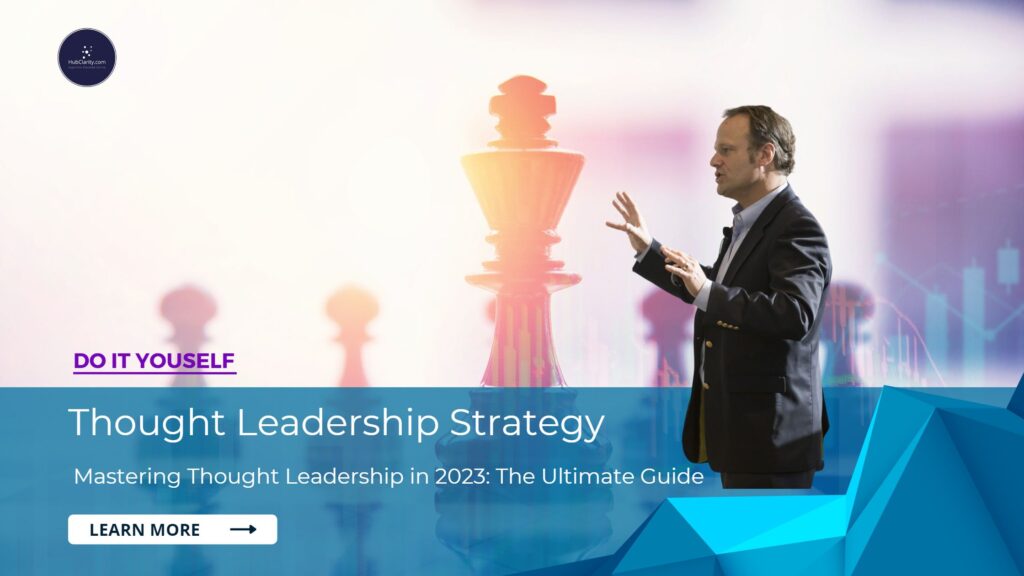What is Online Though Leadership and Why Does it Matter
Thought leadership has long been associated with individuals who possess expertise and exert influence within a particular field, like Neil Degrasse Tyson in astrophysics, Seth Godin in marketing, or Neil Patel in digital marketing. In the digital age, online thought leadership importance has grown, becoming a critical aspect of establishing a strong presence and engaging with a wider audience. In this article, we will delve into the concept of online thought leadership, its importance, and the challenges thought leaders face without a robust online presence. We will also explore the key components and best practices for establishing effective online thought leadership.
Defining Online Thought Leadership
Online thought leadership entails leveraging the power of the internet to position oneself as an expert within a specific domain. Instead of solely relying on traditional media channels, such as TV interviews and seminars, thought leaders can now establish their expertise through various digital platforms, including personal websites, LinkedIn, Twitter, and other social media channels. This approach enables thought leaders to share their insights and ideas with a broader audience, solidify their expertise, and network within their industry.
The Evolution of Online Thought Leadership
While thought leadership itself is not a new concept, the rise of the internet and the increasing significance of online presence have propelled online thought leadership to the forefront. Early adopters, such as Seth Godin, recognized the potential of new mediums for reaching audiences beyond traditional television and radio appearances. The internet has unlocked opportunities for thought leaders to disseminate their ideas, connect with others, and establish their expertise. However, online thought leadership is not merely about having an online presence but also effectively leveraging that presence to build reputation and influence.
Thought Leadership Without an Online Presence: A Competitive Challenge
In today’s digitally connected world, it is becoming increasingly challenging for thought leaders to remain competitive without an online presence. Although some thought leaders may still cater to audiences through traditional media channels, the vast majority of people now consume content online. As a result, thought leaders who lack an online presence are at a competitive disadvantage. To stand out in the digital landscape, thought leaders must identify their minimum viable audience, whose problems they can address, and establish a unique presence amidst the competition.
Online Thought Leadership Importance: Why It Matters
The importance of online thought leadership cannot be overstated for several reasons:
- It enables thought leaders to establish their expertise and build a solid reputation.
- It leads to increased visibility, credibility, and influence, which can help thought leaders advance their careers and achieve their goals.
- It provides thought leaders with a platform to share their ideas and insights with a broader audience.
- It creates opportunities for networking and collaboration, which can propel thought leaders’ careers and ideas forward.
- It offers followers easy access to learn from and interact with their favorite thought leaders.
Key Components of Effective Online Thought Leadership
To establish a successful online thought leadership presence, several key components must be considered:
Quality Content:
Thought leaders must consistently produce high-quality content that showcases their expertise, provides valuable insights, and engages their target audience. This content can take various forms, including blog posts, articles, videos, podcasts, and more.
Consistency:
Regularly updating and sharing content is vital for maintaining an engaged audience and establishing credibility as a thought leader. Consistency demonstrates commitment and helps to build trust with followers.
Personal Branding:
Developing a unique personal brand helps thought leaders differentiate themselves from competitors and create a memorable identity. This branding should be reflected across all online platforms, including website design, content, and social media profiles.
Engagement:
Interacting with followers and other industry professionals is crucial for building connections and fostering a sense of community. Thought leaders should make an effort to respond to comments, participate in online discussions, and collaborate with others in their field.
Multichannel Presence:
Utilizing multiple digital platforms allows thought leaders to reach a wider audience and cater to different content consumption preferences. While a personal website serves as the central hub for thought leadership, social media channels like LinkedIn, Twitter, and YouTube can help disseminate content and facilitate engagement.
Best Practices for Establishing Online Thought Leadership
Identify Your Niche:
Thought leaders should focus on a specific area of expertise that aligns with their passions and knowledge. By concentrating on a niche, thought leaders can more effectively target their audience and position themselves as experts.
Develop a Content Strategy:
Creating a well-defined content strategy helps thought leaders plan, produce, and distribute high-quality content consistently. This strategy should include goals, target audience, content formats, distribution channels, and a content calendar.
Leverage SEO and Social Media:
Thought leaders should optimize their content for search engines and share it across relevant social media platforms. SEO techniques and social media engagement can help improve content visibility and reach a broader audience.
Measure Success:
Regularly monitoring key performance indicators (KPIs), such as website traffic, social media engagement, and content consumption, can help thought leaders gauge the effectiveness of their online presence and adjust their strategy as needed.
Stay Informed and Evolve:
Thought leaders must stay up-to-date with industry trends, emerging technologies, and best practices in order to remain relevant and adapt their online presence accordingly.
Conclusion
In conclusion, a robust online presence, including websites and social media accounts, is essential for thought leaders seeking to make a significant impact within their field. The online thought leadership importance is evident, as it equips thought leaders with a platform to share their ideas, connect with others in their industry, and solidify their expertise. By harnessing the power of the internet, thought leaders can enhance their visibility, credibility, and influence, while reaching a wider audience to amplify the impact of their ideas. By incorporating key components and best practices, thought leaders can establish a strong online presence that effectively showcases their expertise and positions them as influential figures in their domain.


